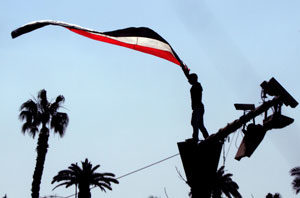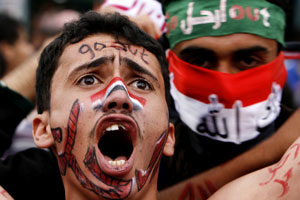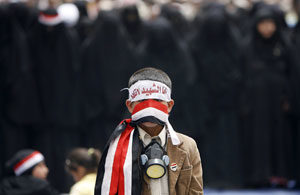Season of Discontent
By Talib Qizilbash | News & Politics | Published 14 years ago
Events are very fluid across the Arab world as unrest and protests continue to evolve and rattle authoritarian regimes across the region. On April 19, 2011, after weeks of violent clashes between pro-democracy protesters and government forces in Syria, President Bashar al-Assad lifted his country’s decades-old emergency laws that gave the government sweeping powers over the population. It was a move he had resisted for weeks, and something protesters wanted badly. But according to the Associated Press, the people of Syria want more: “… emboldened and defiant crowds accused President Bashar Assad of simply trying to buy time while he clings to power in one of the most repressive regimes in the Middle East.”
In this article, which was published in our April issue of the print publication weeks before this latest development, Newsline looks at the new spring that has taken hold across the Arab world and asks, “How will world powers react as more nations stir and evolve with hope and change?”
 The immediate similarities were obvious. When the statue of late President Hafez al-Assad was pulled to the ground by a mob of emboldened Syrian citizens on March 25, it was impossible not to think of the toppling of the statue of Saddam Hussein in Baghdad in 2003. Underneath the parallel imagery though, there are some key differences: citizens of Syria led this charge, not the US army; and further, the statue was not of the current authoritarian ruler, but a dead one. Bringing down Assad’s statue was a frustrated slap by the people demanding political reform and basic freedoms from an oppressive dynastic regime (not just one man) and the restrictive emergency rule imposed 48 years ago.
The immediate similarities were obvious. When the statue of late President Hafez al-Assad was pulled to the ground by a mob of emboldened Syrian citizens on March 25, it was impossible not to think of the toppling of the statue of Saddam Hussein in Baghdad in 2003. Underneath the parallel imagery though, there are some key differences: citizens of Syria led this charge, not the US army; and further, the statue was not of the current authoritarian ruler, but a dead one. Bringing down Assad’s statue was a frustrated slap by the people demanding political reform and basic freedoms from an oppressive dynastic regime (not just one man) and the restrictive emergency rule imposed 48 years ago.
The absence of the US in the events unfolding in Syria is not a simple footnote. As the government of Syria’s current ruler, Bashar al-Assad, shoots at and kills protesters, much like Bahraini forces did at the now-razed Pearl Roundabout and President Ali Abdullah Saleh’s security forces did in Yemen, people around the world ask why the US government is not supporting the people and intervening like it has in Libya.
The US government has always preached democracy, but it has not always supported it. US strategic interests rarely align themselves with the people’s interests in the autocrat-ruled Arab world. As such, selective intervention prevails. Bernd Debusmann, in a column for Reuters, explains things this way: “So why Libya and not Yemen and Bahrain? Here is where lofty talk of universal values collides with self-interest and here is where policies the United States pursued for more than half a century live on. George W. Bush’s secretary of state, Condoleezza Rice, put it succinctly in a 2005 speech in Cairo: ‘For 60 years, my country, the United States, pursued stability at the expense of democracy…here in the Middle East.’ It still does, where Yemen and Bahrain are concerned. As a newly leaked cable (dating back to 2005) from the US Embassy in the Yemeni capital put it: ‘Saleh has provided Yemen with relative stability…but has done little to strengthen government institutions or modernise the country. As a result, any succession scenario is fraught with uncertainty.’”
And while comparisons were also being made between Libya 2011 and Iraq 2003, Washington and its hawks were quick to explain to the world that Libya is “different.” Firstly, they said, the Arab league set the wheels in motion when they feared a massacre in the North African country. As such, the international community acted and passed UN resolution 1973, which calls for a no-fly zone (NFZ). Secondly, they argued, the NFZ was implemented not as a tool to facilitate regime change but as a means to protect the Libyan people from attacks by their own government, which “might constitute crimes against humanity.” Thirdly, the resolution, does not allow for the occupation of Libyan territory by international forces.
Interestingly, though, during the first days of the attack on Libya’s military assets, no one in the west wanted to publicly take the lead. While President Barack Obama and Secretary of State Hillary Clinton spoke purposefully about the campaign to stop Gaddafi, the US did not want to be seen as the leader in this military joint venture. Neither did Britain or France. It was an odd sight for a campaign that has been consistently trumpeted as good and just.
Within no time that wariness was better understood. As the key allied powers dealt circuitously with the growing talk that regime change was the main goal, the growing scale of the attacks against Libya drew criticism too. In fact, the display of unapologetic might to enforce the NFZ has been disconcerting to many leaders within the Arab League who have publicly censured Britain, France and the US for exceeding their mandate and putting innocent lives at risk. From day one, everyday people around the world questioned the wisdom of using bombs to protect and liberate.
 In the US, approval for the Libyan campaign has been hard to come by for Obama. Across the country war-weary voters are worried that another US-led military campaign would empty the public purse and see more young American soldiers traumatised, injured and killed. In a televised address to the nation late last month, Obama said it was a tough but necessary choice. “We knew that if we waited one more day, Benghazi — a city nearly the size of Charlotte — could suffer a massacre that would have reverberated across the region and stained the conscience of the world,” said the US president, who also assured his compatriots that no ground troops would be sent in.
In the US, approval for the Libyan campaign has been hard to come by for Obama. Across the country war-weary voters are worried that another US-led military campaign would empty the public purse and see more young American soldiers traumatised, injured and killed. In a televised address to the nation late last month, Obama said it was a tough but necessary choice. “We knew that if we waited one more day, Benghazi — a city nearly the size of Charlotte — could suffer a massacre that would have reverberated across the region and stained the conscience of the world,” said the US president, who also assured his compatriots that no ground troops would be sent in.
Despite not being part of the UN mandate, regime change has become the focus of the united effort against Libya. On March 29, world leaders met in London to strategise over how to expedite Gaddafi’s capitulation and chart out a post-Gaddafi future. There was talk about a transition to democracy involving tribal leaders, political opposition leaders and civil society.
Since unrest escalated in Libya, world leaders have proclaimed Gaddafi’s dangerous unpredictability, drawing attention to his willingness to kill his own people. They promised they would focus “on his actions, not his words.” But the deadly actions of rulers in Bahrain (home to a major US military fleet) and Yemen (home to a regime that has cooperated in the fight against Al-Qaeda in the Arabian Peninsula) have been overlooked. And then there are still those actions of the authoritarian regime in Syria.
The widespread protests that erupted across Syria after 15 school children were arrested for spraying pro-democracy graffiti has led to injuries and dozens of deaths. Unfortunately, Syria is no stranger to brutal crackdowns. At least 10,000 were killed in 1982 when Syrian forces ruthlessly crushed an uprising by the Muslim Brotherhood in Hama. So there is a fear that today’s situation could worsen. It wouldn’t be difficult to believe that a US that is silent on Syria is a US that is hoping to see Iran’s main ally in the Arab world crumble. However, that would only be partly true. “The new American ambassador in Damascus, Robert Ford, has been quietly reaching out to Mr Assad to urge him to stop firing on his people,” wrote Mark Landler in The New York Times. American officials are also very concerned that the once rock-solid Syria is now in the throes of a crisis that “could destabilise neighbours like Lebanon and Israel.” The ouster of Egypt’s Hosni Mubarak has been worrisome for Israel, wrote Landler, and unrest in Syria makes things even less comforting for the Jewish state.
It seems no country will be left untouched in the region. “I don’t think the Middle East will be the same. It is a new order in the making,” Fawaz Gerges from the London School of Economics told Reuters.
By the end of March, Jordan, which had so far stayed out of international headlines, began to feel the first pangs of that new order. Public protests became big and violence ensued. “What happened today is definitely the start of chaos and it is unacceptable and I warn of the consequences,” Jordanian Prime Minister Marouf al-Bakhit said on Jordanian television after clashes led to at least one man being killed. These events, too, have both the US and Israel worried. Jordan like Egypt has a peace treaty with Israel. No one knows what chaos and a new regime would bring.
As rulers such as Jordan’s Bakhit and Syria’s Assad resist the tectonic shifts in the political landscape, just as so many of their stubborn contemporaries have, they must also realise that this is just the beginning. Arab youth across the region are becoming increasing fearless, emboldened by the success of protests in Tunisia and Egypt. They are unlikely to give up in the face of potential short-term setbacks. “What we’ve seen in the other revolts in the region suggests that in Syria, even if the popular opposition is stemmed in coming weeks, it will resurface. Once you have broken the barrier of fear, it is probably a matter of when, not if, a regime falls,” Maha Azzam, an analyst at Chatham House, told Reuters.
Those countries still untouched by major violence are trying to delay that day of reckoning. Saudi Arabia has have been quick to dish out huge benefits to it citizens in order to quell any potential discontent, doubling a fund for nationals (for things like homes, weddings and businesses) and initiating unemployment assistance. The Sheikhs of the UAE, though, aren’t just worried about the burgeoning youth population. In a move that seems clearly designed to keep experienced military men from being lured by any rebel groups, the small and still peaceful Arab nation announced a retroactive 70% increase to the pension allowances and end of service bonuses for retired defence staff and military personnel. Smart rulers have realised that they can, at least temporarily, feign generosity and buy themselves an extension.
And according to some intellectuals, substituting freedoms for a decent standard of living and stability is something that many Arabs should be happy with. At a security conference in the UAE in March, which heard from the likes of retired US General Colin Powell, experts argued good governance is more important that democracy. Gulf News reported that Dr John Chipman, chief executive of the International Institute for Strategic Studies, said good governance without democracy is preferable to democracy without good governance, warning that the latter can lead to chaos. “Chipman cited Singapore as an example of good governance without democracy and Pakistan as democracy without good governance,” reported the UAE-based newspaper.
It is hard to imagine that so much change has been sparked by Mohamed Bouazizi, a desperate Tunisian who set himself on fire on January 4 to protest abusive treatment by police. The unforeseen domino effect has so far knocked over two regimes and is about to claim a third: Yemen’s President Saleh. The move by his army generals to support Yemeni protesters was a swift kick in the shin for Saleh, hobbling the long-time ruler. There is much speculation about how Syria’s army will behave if clashes with supporters escalate. Increased protestor momentum may weaken the ruling family and cause the army to distance itself from them. Some experts have said continued unrest would make it difficult for a mostly Sunni army to attack Sunni protestors. A similar result occurred when two Libyan fighter pilots landed their jets in Malta earlier this year after refusing to fire on their fellow citizens. The Pakistani army dealt with the same difficulty in recent years when its own troops laid down their weapons after wrestling with the guilt of fighting their Muslim ‘brothers’ in FATA and the NWFP. As Faysal Itani of Exclusive Analysis told Reuters, in Syria the question is not whether the regime is willing to fire its own people. “The question is whether they have enough troops willing to do it.”
 The future of Syria lies in the hands of its president. And they don’t have to get bloodied. “Unlike most of his peers in the region, President Assad has accumulated significant political capital, and many Syrians are willing, for now, to give him the benefit of the doubt,” wrote the International Crisis Group (ICG) in a media update on March 25. While there have been assurances the emergency law will be repealed, he will have to do much more, and start immediately. “Repression perpetrated under his responsibility is costing him dearly,” writes the ICG. “He alone can prove that change is possible and already in the making…and put forward a detailed framework for structural change.”
The future of Syria lies in the hands of its president. And they don’t have to get bloodied. “Unlike most of his peers in the region, President Assad has accumulated significant political capital, and many Syrians are willing, for now, to give him the benefit of the doubt,” wrote the International Crisis Group (ICG) in a media update on March 25. While there have been assurances the emergency law will be repealed, he will have to do much more, and start immediately. “Repression perpetrated under his responsibility is costing him dearly,” writes the ICG. “He alone can prove that change is possible and already in the making…and put forward a detailed framework for structural change.”
Unfortunately, Assad seems to be unwilling to do that any time soon. On March 30, after days of fatal unrest, he addressed the nation via a speech performed in parliament but offered few concessions to opposition forces. While he raised the issue of the unpopular emergency laws, there was no clear announcement declaring an end to them [Editor’s note: The laws have since been repealed]. He instead spouted mendacious propaganda about foreign conspirators and internal mischief makers being behind the chaos in the streets. This angered activists who were expecting more after the cabinet resigned a day earlier. Now it’s clear that that move was wholly symbolic as the real policy-making power lies with the president and he refused to disclose any concrete policy reforms. Reactions online were harsh with Syrians tweeting that they were “embarrassed” of their parliament and Assad’s “bad” speech. After the presidential address, more violence broke out in the port city of Latakia.
The US expressed disappointment with Assad’s speech and is still waiting for him to make real changes. It does not want to intervene. “Some analysts predicted the [Obama] administration would be cautious in pressing Mr Assad, not because of any allegiance to him but out of fear of what could follow him — a Sunni-led government potentially more radical and Islamist than his Alawite minority regime,” writes Landler in the NYT.
Of course, Iran wouldn’t sit back and allow its friend Syria to change direction so suddenly either. So while the US keeps quiet on Syria, it might be a big regional player instead that steps in to see Assad retain his grip on the reins of his country.


